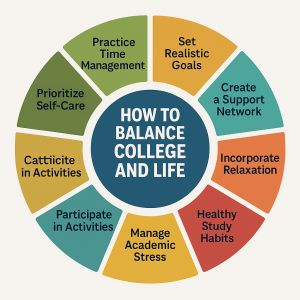In today’s academic landscape, students juggle demanding schedules—between classes, assignments, social life, work, and extracurricular activities. With so much competing for attention, it’s easy to feel overwhelmed, constantly torn between priorities. Achieving study-life balance isn’t just about time management; it’s about cultivating awareness, setting boundaries, and practicing habits that support both academic success and personal wellbeing.
Understanding What “Balance” Actually Means
It’s common to think that balance means allocating equal time for everything—studying, socializing, relaxing. In reality, life is more like a seesaw: some days require more focus on academics, others on mental rest or social connection. Sustainable harmony—not perfection—should be your goal.
Start by reflecting on how you define “balance.” What activities help you recharge? Which routines fuel your best study sessions? Identifying these patterns helps you intentionally build routines that support both productivity and joy.
The following visual outlines the essential components of balance in college life—and how they interact day by day:

Build a Framework Rooted in Purpose
A balanced routine should align with your personal goals—academic, career, and wellness. When classes demand rigorous focus, your schedule shifts; when burnout strikes, your self‐care needs come forward. Here’s a simple framework:
-
Weekly Plan – Every Sunday evening, list out your commitments: classes, deadlines, work shifts, and social events. Estimate realistic study time for each subject.
-
Daily Rhythm – Build blocks based on your peak focus hours. If you’re alert in the mornings, schedule challenging study sessions early; reserve lower-energy times for lighter tasks or social check-ins.
-
Recharge Rituals – Dedicate at least one small “pause ritual” daily—like a 10-minute meditation, short walk, or a call to a friend. These brief pauses can dramatically boost resilience during busy weeks.
Consistently aligning your week and day with your core values turns balance into an active, achievable process.
Combatting Overcommitment and Decision Fatigue
University life pulls you in many directions: student clubs, volunteer roles, part-time jobs, social circles. While these activities are valuable, they also come with hidden costs—mental clutter, tiredness, an unaffordable activity schedule.
Instead of saying “yes” to every opportunity, become intentional about what aligns with your values. Evaluate each commitment based on whether it feeds your academic or personal growth, how much you’d regret not participating, and whether you can realistically devote time and energy.
Learning to decline with grace opens space for truly meaningful experiences. Your time and energy are finite. Cultivating intentional boundaries is a form of self-care that sustains long-term wellbeing.
The College Burnout Trap
Students frequently overlook burnout—until it hits. You know the signs: persistent exhaustion, detachment, feeling ineffective. Burnout doesn’t happen only in senior year—it can appear as early as your first semester.
Protecting yourself from burnout requires both prevention and intervention:
-
Prevention: Take small breaks—one healthy snack, one stretch, or a social media break—for every hour of study. Keep sleep non-negotiable: aim for 7–8 hours each night, even during exam periods.
-
Intervention: If burnout emerges—stop. Prioritize rest, talk with a counselor or supportive friend. Lighten your load by dropping elective tasks or reducing work hours while you recharge.
Burnout isn’t weakness; it’s a warning sign. Respond to it with compassion and action.
Study Smarter, Not Harder
Efficiency isn’t cheating—it’s effective learning. Habits that make academic life smoother include active learning techniques, time boxing, and weekly reviews. Active learning (flashcards, quizzes, teaching back to yourself) helps you truly internalize information, whereas passively reading notes won’t embed knowledge deeply.
Use time boxing to commit to focused 25–45 minute study blocks, followed by 5–10 minute breaks. This rhythm keeps motivation high and energy sustainable. Additionally, set aside 30 minutes each week to clarify notes, identify weak areas, and create a plan for next week. Small habits like these prevent surprise cramming and anxiety, freeing up more time for social interactions and rest.
Navigating Social Life Without Regret
Social events can offer joy—or fuel guilt. Before attending events, ask yourself: “Will this gathering refresh or drain me?” and “Is this an important memory trigger—something I’ll thank myself for later?” Finally, consider how you’ll spend your time if you decide not to attend.
When you skip a late-night social event, reclaim the evening by reading, watching something you love, or catching up on sleep. Balancing presence and priority ensures your social life enhances—not detracts from—your overall wellbeing.
Self-Care Isn’t a Luxury
Self-care isn’t indulgent—it’s foundational. Three habits significantly impact your overall balance: sleep hygiene, moving your body, and mental resets.
Stick to consistent wake and sleep times, avoiding screens 30 minutes before bed. These habits improve memory, mood, and exam performance. Incorporate regular, even light physical activity—like walking or dancing in your room—to boost focus, mood, and resilience. Lastly, adopt portable mental reset routines, such as breathing exercises, journaling, or listening to a favorite song.
These small investments repay you with clarity, energy, and emotional steadiness.
When to Ask for Help
Balance isn’t a solo act. You aren’t expected to manage everything yourself. Reach out when you experience symptoms such as sleeplessness from worry, dread over opening textbooks, or noticeable mood changes.
Connect with campus mental‑health services, trusted friends, or family. You don’t have to navigate challenging periods alone—seeking support is a sign of strength, not failure.
Celebrate Progress—Small Wins Add Up
Focusing solely on final grades or future goals can obscure everyday progress. Notice and celebrate small victories like finishing a chapter, delivering a class presentation, or having a meaningful conversation. These micro-wins keep balance grounded in progress—not perpetual struggle.
Consider maintaining a gratitude journal; noting three things you’re grateful for each night can gradually shift your mindset, even during high-stress periods.
Pulling It All Together
Striking balance as a student isn’t about rigid schedules—it’s about designing your life around what matters. You don’t need to be everything to everyone. Instead, focus on aligning your choices with your goals, boundaries, and values.
Anchor each week in planning aligned with your needs, energy levels, and priorities. Pivot smoothly between work and rest. Honor your boundaries, and don’t hesitate to lean on your support network. With strong foundations—rest, movement, connection, and focused study—you’ll thrive academically, form deeper relationships, and build a sustainable path forward.
Final Thought
Balance isn’t elusive—it’s built on daily, intentional choices. Design your week around what truly matters—health, purpose, relationships, growth. You don’t have to juggle everything perfectly; you simply need to juggle wisely. Habits cultivated now will follow you beyond graduation, shaping not just your college experience, but the fulfilling life you build afterward.
